Who We Are
The Guardians of the Forest Institute is a non-governmental organization focused on preserving the Amazon and strengthening the traditional culture of the people who inhabit it.
The objective of the IGF is to assist in the preservation and appreciation of these cultures, which, with a vast knowledge of the Amazon ecosystem, have lived for thousands of years in integration with nature, as guardians of this precious heritage of humanity.
The IGF seeks to provide conditions so that these people, in addition to perpetuating the traditions and knowledge of their ancestors, can also continue to develop their research, deepening their studies and providing integrated development with natural and human sciences.
We are currently developing projects related to safeguarding the intangible memory of these people. Since its founding in 2010, the IGF has served the ethnic groups that live in the forest. The Institute’s principle is to contribute to meeting the real needs of these people, enabling projects demanded by the communities themselves, in close partnership with indigenous leaders, cooperatives and grassroots associations, through a relationship that has been built over eleven years. years between IGF members and indigenous peoples.
History
IGF was born from the cultural exchange between indigenous peoples and people from the city, who felt the need to contribute more actively to the preservation of the environmental and human heritage of the Amazon Forest.
A multidisciplinary group was then formed to develop projects and actions that will produce effective results in protecting the environment and improving the living conditions of traditional peoples.
Held in the village of the Kuntanawa people, on the Tejo River, between July 26 and 31, 2010, with the support of the Secretary of Identity and Cultural Diversity of the Ministry of Culture.
The Festival brought together, for the first time, representatives from 13 ethnic groups of the Pano linguistic trunk of the state of Acre, with the intention of strengthening the expressions of traditional culture, and also to discuss with the indigenous leaders present the issues that affect the lives of these people.
During the festival, there was an articulation and mobilization among the various ethnic groups in favor of a greater cultural exchange and strengthening of ties, stimulating the exchange of knowledge (stories, body paintings, dances, games, sacred songs, handicrafts, medicinal plants), and the political structuring of the Pano linguistic trunk, aiming at the appreciation and perpetuation of the culture of these people by themselves. This festival was sponsored by the Ministry of Culture
Held in the village of the Kuntanawa people, on the Tejo River, between July 26 and 31, 2010, with the support of the Secretary of Identity and Cultural Diversity of the Ministry of Culture.
The Festival brought together, for the first time, representatives from 13 ethnic groups of the Pano linguistic trunk of the state of Acre, with the intention of strengthening the expressions of traditional culture, and also to discuss with the indigenous leaders present the issues that affect the lives of these people.
During the festival, there was an articulation and mobilization among the various ethnic groups in favor of a greater cultural exchange and strengthening of ties, stimulating the exchange of knowledge (stories, body paintings, dances, games, sacred songs, handicrafts, medicinal plants), and the political structuring of the Pano linguistic trunk, aiming at the appreciation and perpetuation of the culture of these people by themselves. This festival was sponsored by the Ministry of Culture.
Held between the 16th and 20th of October 2010, brought together indigenous leaders of 14 ethnicities belonging to the linguistic trunk Pano, in the Katukina Indigenous Land, in order to discuss strategies for strengthening cultural expressions and address the issue of registration of ayahuasca as Cultural Heritage of Brazil by IPHAN, seeking the integration of indigenous peoples in the process.
It took place in October 2011 in the city of Rio de Janeiro, with support from the Ministry of Culture, and had as its main objective to provide input for the process of registration of ayahuasca as intangible cultural heritage of Brazil, already underway by IPHAN, and to formulate public policies for ayahuasca communities in Brazil.
The use of ayahuasca in Brazil is traditional among many indigenous peoples of the western Amazon Basin. After the contact of these peoples with non-indigenous society, other lines have emerged, bringing different forms of ritual use of ayahuasca.
Considering that in Brazil we have an immense wealth and cultural diversity manifested in this universe ayahuasca, under the most diverse artistic products, was produced an audiovisual documentary of musical performances, dances, theater, photographic and audiovisual exhibitions, literature, lectures and round tables for debate and reflection.
Yawanawa cultural meeting held in Lumiar – Nova Friburgo with the participation of a delegation composed of 20 Yawanawa leaders bringing some of the experience of the Yawa festival that takes place in the Nova Esperança Village – AC.
With the intention of organizing the participation of tourists in the traditional festivities, chief Siã and family invited the IGF to compose the production of this festival that had leaders from all the indigenous land of the Jordan River sharing their knowledge and way of life.
Yawanawá: In the Heart of the World is a multimedia sensory exhibition by photographer Marcos Lopes about the Yawanawá people. The exhibition sought to transport the public to the Amazon rainforest, in scenographic and sound immersion environments, in addition to images, adornments and ritualistic objects, revealing the culture, tradition and art of this people. The exhibition opened in Rio de Janeiro in June 2012, during Rio+20, in the official space of the Ministry of Culture.
The IGF articulated the exhibition space, organized the arrival and stay of the Yawanawa delegation to Rio de Janeiro and mediated the relationship with the visiting public.
Celebrating the cultural revival of the Yawanawa people, the second Yawa mini Festival brought to the city knowledge of dances, songs, games and prayers of the Yawanawa people.
The Festival took place in Rio de Janeiro during Rio+20, bringing together leaders of various indigenous peoples, promoting cultural exchange among the ethnic groups present and facilitating the exchange of knowledge between indigenous and non-indigenous peoples.
This is an international meeting for the free seeds movement, produced by Kokopeli, a French organization that has been working for 30 years, with a large collection of traditional seeds. During the meeting in August 2012 in Ollantaytambo, Peru, the first Network for the Defense of Free Seeds in the Americas was created. Representatives of peasant and indigenous organizations, educators, autonomous collectives, and various other movements signed the document where the first members of the network formalized its principles, providing for the valuing of autonomous seed savers, their collectives, and associations. The main idea of the signatories was to create an articulation network, hold seed exchange fairs, and share knowledge about sustainable practices of planting, consumption, and commercialization.
Through the Guardians of the Forest Institute, with support from the Ministry of Culture, the Huni Kuin people shared their work with traditional seeds, their experiences in agroecology, their medicinal plants, and the project for the first Huni Kuin (Kaxinawá) Traditional Seed House of the Hanu Heshe Ati Hewe River. Joining the newly created network of Free Seeds of America
Held between September 3rd and 7th, by the ‘Protected Florest Association’, it brought together representatives from 18 communities of the Kayapó ethnic group, in the Moikarakô village, in Pará, adding up to approximately 1,200 people with representatives from 15 indigenous ethnic groups in Brazil.
At the invitation of the Protected Forest Association, the Guardians of the Forest Institute accompanied the trip of three Huni Kuin representatives of AMAAIAC- Association of the Movement of Indigenous Agroforestry Agents of Acre and a master Huni Kuin artisan, with support from the Pro-Indian Commission of Acre.
Throughout the meeting, the indigenous peoples present participated in lectures, workshops, cultural presentations of traditional singing and dancing, round tables on food sovereignty and security, public policies for indigenous peoples, policies to promote forest conservation, environmental and territorial management of their lands, among other topics, in addition to the seed exchange fair every morning.
It was held in the São Joaquim village, the Memory Center of the Huni Kuin people, in the Kaxinawá Indigenous Land of the Lower Jordan River, between December 3rd and 15th, 2011. The workshop brought together for the first time shamans and young shaman apprentices from 23 villages of the Huni Kuin people of the Lower Jordan and Lower Tarauacá for a meeting to exchange experiences about the cultural practices of the people.
During the 12-day workshop, the heritage of the Huni Kuin’s ancestral knowledge about medicine was transmitted to the young apprentice shamans through classes, lectures, storytelling, the exchange of experiences and knowledge, and the manipulation of plants, either in the identification, cultivation or treatment of diseases.
The Pajés’ Meeting was made through a partnership between IGF, the Botanical Garden of Rio de Janeiro, and the NGO Conservation International, and was awarded the ‘Funarte Amazônia Legal Prize’. The healing book Una Isi Kayawa, product of this workshop, was released in 2014.
Una Isi Kayawa: Book of Healing is a pioneering book that brings together the deep knowledge of plants and medicinal practices of the Huni Kuin indigenous people, also known as Kaxinawa, the largest indigenous population inhabiting the Rio Jordão region in Acre. Until then accessible only through oral tradition, this ancestral knowledge is now beginning to become available to all humanity.
The artist Ernesto Neto held the exhibition Aru Kuxipa at the TBA 21 gallery in Vienna’s Algarten park, in partnership with the Huni Kuin.
The artist invited the IGF to work on the logistical organization involving the delegation’s trip to Vienna, mediating and translating the Huni Kuin representatives’ interaction with the exhibition participants.
‘Water Txai’ brought drinking water to the Altamira village, on the Tarauacá River – Acre. The village was constantly suffering from problems arising from water contamination, a fact that mobilized a team to research and install the rainwater harvesting system, being this the first of a series of improvements carried out in this village.
From 2015 to 2019 the IGF held monthly meetings at Parque Lage with indigenous leaders from various peoples to present their cultures and musicality. The Kupixawa of Parque Lage received leaders of the Huni Kuin, Yawanawa, Tukano, Guarani, Krenak, Ashaninka, Assurini, Guajajara, Fulni-ô, Shipibo peoples, among others.
The Huni Kuin cooperative was born with the intention of organizing and promoting the production and sale of handicrafts, food and other products from the forest. Aru Kuxipa has a grocery store in the municipality of Jordao that sells goods to the indigenous people at a reduced cost or on a barter basis.
The IGF supported the reorganization of the cooperative by raising the necessary funds and working on legal and bureaucratic issues.
Una Shubu Hiwea is a project created by Huni Kuin shamans who live in the 36 villages of the indigenous lands of Rio Jordão and Upper Tarauacá river, in the Amazon Forest of Acre. Meetings, workshops, assemblies were held and, with support from Rumos Itaú Cultural, in 2014, booklets were distributed in all the villages of the Jordão and Tarauacá rivers, an action that gave rise to the publication of a book, an exhibition, a film, and the construction of a school in the village Coração da Floresta, by shaman Rua Busẽ, which were presented at the Itaú Cultural Center in 2017.
The encounter between the city and the forest is the essence of Mi Mawai, which promotes dialogue between cultures through the universal language of music. Established in a partnership between Etnohaus, a collective of artists and producers from Rio de Janeiro, and the Huni Kuin Guardians of Rio de Janeiro, a group that works on the connection between the forest and the city, articulating a web of global support to indigenous peoples since 2005, Mi Mawai is a transmedia music label of artistic collaboration involving artists from the city and the forest. The mix between the musicality of indigenous songs and “urban” instruments such as guitar, bass and drums creates a unique and special sound. The strength of the villages is recreated in a new format, which invites everyone to listen, dance and dive into a unique experience.
Travel of a Yawanawa entourage taking their culture, way of life and spirituality to Europe. With these tours the Yawanawa connect to a global network of people who become supporters of indigenous causes.
the project Mi Mawai & Kayatibu was selected by the Itaú Cultural’s Rumos edict, resulting in an artist residency held in March 2019, which promoted a broad exchange of knowledge. Through singing, body and instruments, a team formed by music artists facilitated a series of training workshops, addressing techniques and practices to enhance the group’s musical awareness. In parallel, an audiovisual workshop worked on the conception and production of the video clips for each song recorded during the residency.
A film about contemporary indigenous music and ancestral rights that produced encounters between indigenous and non-indigenous people about a key issue in the perpetuation of ancient cultures of original peoples, modernity inside: the collective and ancestral copyright of a people.
The material in the film is composed of three online conversation rounds between artists, musicians, articulators, and experts on copyright and composition royalties, etc., which are broadcast live on the Mi Mawai YouTube channel.
The Ikamuru Pajé, from the Boa Vista village, in the middle of Rio Jordão – AC, is without a doubt a living library.
A connoisseur of various traditional songs, he is also a kind of Huni Kuin doctor, always planting and harvesting medicines from the forest, besides praying for the sick and teaching the traditions to the younger ones. Recently he has begun to travel the world taking his culture to various places such as Mexico, where he has formed an alliance with the Wixarica people, in the Wirikuta desert, and in the San Andres community. He is also a great patriarch, father of six children, all students on the path of medicine, they always count on his support, good advice, and teachings.
The IGF mobilized an international crowdfunding campaign, arranged for the shaman’s emergency surgery, and has been caring until the shaman’s successful return to the village.
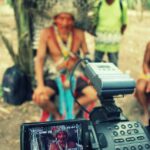
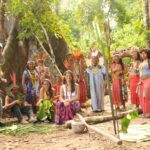
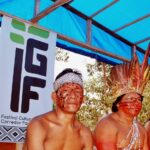
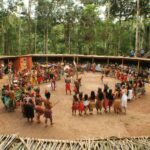
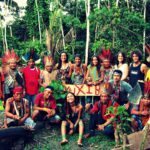
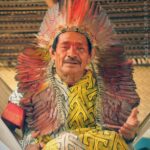
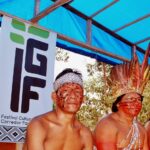
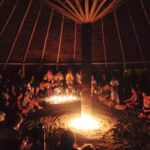
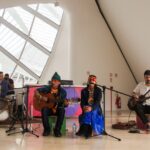
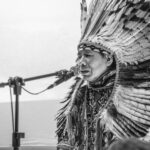
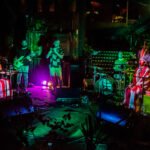
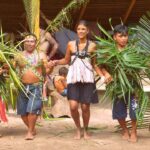
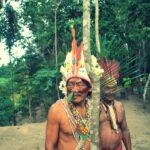
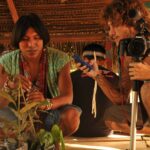
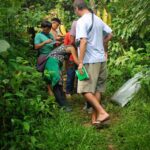
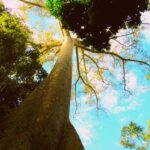
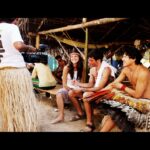
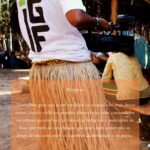
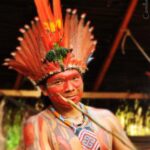
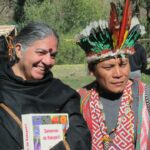
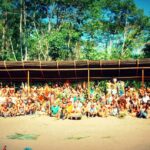
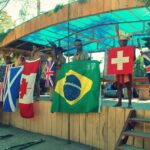
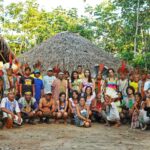
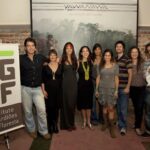
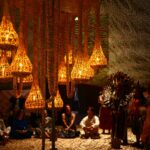
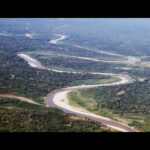
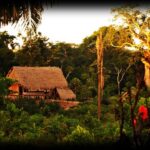
Statute
– The Amazon Rainforest is the largest forest in the world, with the highest concentration of fresh water and biodiversity on the planet.
– More than one third of all species on earth live and reproduce in the Amazon.
– The Amazon River flows into the Atlantic Ocean, releasing into the sea about 175 million liters of water every second. This corresponds to 20% of the combined flow of all the rivers in the world.
– The Amazon forest covers 6.5 million square kilometers, of which 4 million are in Brazilian territory.
The IGF acts permanently as a facilitator of relations between indigenous and non-indigenous people and institutions that contribute to the continuity of traditional knowledge.
Areas of action of the Multidisciplinary team:
- Cultural Producers
- Educators
- Psychologists
- Anthropologists
- Builders
- Archaeologist
- Historians
- Geographers
- Lawyers
- Journalists
- Administrators
- Designers
- Filmmakers
- Sound technician
- Photographers
- Art directors
- Translators
- Content creators
- Therapists
- Artists
- Musicians